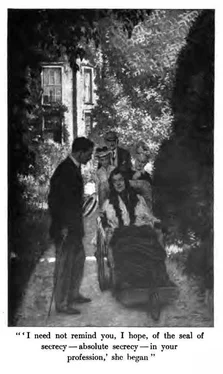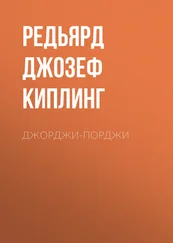"All this within a hundred miles of London," he said. "Looks as if it had had nervous prostration, too." The footpath turned the shoulder of a slope, through a thicket of rank rhododendrons, and crossed what had once been a carriage drive, which ended in the shadow of two gigantic holm–oaks.
"A house!" said Sophie, in a whisper. "A Colonial house!"
Behind the blue–green of the twin trees rose a dark–bluish brick Georgian pile, with a shell–shaped fan–light over its pillared door. The hound had gone off on his own foolish quests. Except for some stir it the branches and the flight of four startled magpies; there was neither life nor sound about the square house, but it looked out of its long windows most friendlily.
"Cha–armed to meet you, I'm sure," said Sophie, and curtsied to the ground. "George, this is history I can understand. We began here." She curtsied again.
The June sunshine twinkled on all the lights. It was as though an old lady, wise in three generations' experience, but for the present sitting out, bent to listen to her flushed and eager grandchild.
"I must look!" Sophie tiptoed to a window, and shaded her eyes with her hand. "Oh, this room's half–full of cotton–bales—wool, I suppose! But I can see a bit of the mantelpiece. George, do come! Isn't that some one?"
She fell back behind her husband. The front door opened slowly, to show the hound, his nose white with milk, in charge of an ancient of days clad in a blue linen ephod curiously gathered on breast and shoulders.
"Certainly," said George, half aloud. "Father Time himself. This is where he lives, Sophie."
"We came," said Sophie weakly. "Can we see the house? I'm afraid that's our dog."
"No, 'tis Rambler," said the old man. "He's been, at my swill–pail again. Staying at Rocketts, be ye? Come in. Ah! you runagate!"
The hound broke from him, and he tottered after him down the drive. They entered the hall—just such a high light hall as such a house should own. A slim–balustered staircase, wide and shallow and once creamy–white, climbed out of it under a long oval window. On either side delicately moulded doors gave on to wool–lumbered rooms, whose sea–green mantelpieces were adorned with nymphs, scrolls, and Cupids in low relief.
"What's the firm that makes these things?" cried Sophie, enraptured. "Oh, I forgot! These must be the originals. Adams, is it? I never dreamed of anything like that steel–cut fender. Does he mean us to go everywhere?"
"He's catching the dog," said George, looking out. "We don't count."
They explored the first or ground floor, delighted as children playing burglars.
"This is like all England," she said at last. "Wonderful, but no explanation. You're expected to know it beforehand. Now, let's try upstairs."
The stairs never creaked beneath their feet. From the broad landing they entered a long, green–panelled room lighted by three full–length windows, which overlooked the forlorn wreck of a terraced garden, and wooded slopes beyond.
"The drawing–room, of course." Sophie swam up and down it. "That mantelpiece—Orpheus and Eurydice—is the best of them all. Isn't it marvellous? Why, the room seems furnished with nothing in it! How's that, George?"
"It's the proportions. I've noticed it."
"I saw a Heppelwhite couch once"—Sophie laid her finger to her flushed cheek and considered. "With, two of them—one on each side—you wouldn't need anything else. Except—there must be one perfect mirror over that mantelpiece."
"Look at that view. It's a framed Constable," her husband cried.
"No; it's a Morland—a parody of a Morland. But about that couch, George. Don't you think Empire might be better than Heppelwhite? Dull gold against that pale green? It's a pity they don't make spinets nowadays."
"I believe you can get them. Look at that oak wood behind the pines."
"'While you sat and played toccatas stately, at the clavichord,"' Sophie hummed, and, head on one; side, nodded to where the perfect mirror should hang:
Then they found bedrooms with dressing–rooms and powdering–closets, and steps leading up and down—boxes of rooms, round, square, and octagonal, with enriched ceilings and chased door–locks.
"Now about servants. Oh!" She had darted up the last stairs to the chequered darkness of the top floor, where loose tiles lay among broken laths, and the walls were scrawled with names, sentiments, and hop records. "They've been keeping pigeons here," she cried.
"And you could drive a buggy through the roof anywhere," said George.
"That's what I say," the old man cried below them on the stairs. "Not a dry place for my pigeons at all."
"But why was it allowed to get like this?" said Sophie.
"Tis with housen as teeth," he replied. "Let 'em go too far, and there's nothing to be done. Time was they was minded to sell her, but none would buy. She was too far away along from any place. Time was they'd ha' lived here theyselves, but they took and died."
"Here?" Sophie moved beneath the light of a hole in the roof.
"Nah—none dies here excep' falling off ricks and such. In London they died." He plucked a lock of wool from his blue smock. "They was no staple—neither the Elphicks nor the Moones. Shart and brittle all of 'em. Dead they be seventeen year, for I've been here caretakin' twenty–five."
"Who does all the wool belong to downstairs?" George asked.
"To the estate. I'll show you the back parts if ye like. You're from America, ain't ye? I've had a son there once myself." They followed him down the main stairway. He paused at the turn and swept one hand toward the wall. "Plenty room, here for your coffin to come down. Seven foot and three men at each end wouldn't brish the paint. If I die in my bed they'll 'ave to up–end me like a milk–can. 'Tis all luck, dye see?"
He led them on and on, through a maze of back kitchens, dairies, larders, and sculleries, that melted along covered ways into a farm–house, visibly older than the main building, which again rambled out among barns, byres, pig–pens, stalls and stables to the dead fields behind.
"Somehow," said Sophie, sitting exhausted on an ancient well–curb—"somehow one wouldn't insult these lovely old things by filling them with hay."
George looked at long stone walls upholding reaches of silvery–oak weather–boarding; buttresses of mixed flint and bricks; outside stairs, stone upon arched stone; curves of thatch where grass sprouted; roundels of house–leeked tiles, and a huge paved yard populated by two cows and the repentant Rambler. He had not thought of himself or of the telegraph office for two and a half hours.
"But why," said Sophie, as they went back through the crater of stricken fields,—"why is one expected to know everything in England? Why do they never tell?"
"You mean about the Elphicks and the Moones?" he answered.
"Yes—and the lawyers and the estate. Who are they? I wonder whether those painted floors in the green room were real oak. Don't you like us exploring things together—better than Pompeii?"
George turned once more to look at the view. "Eight hundred acres go with the house—the old man told me. Five farms altogether. Rocketts is one of 'em."
"I like Mrs. Cloke. But what is the old house called?"
George laughed. "That's one of the things you're expected to know. He never told me."
The Clokes were more communicative. That evening and thereafter for a week they gave the Chapins the official history, as one gives it to lodgers, of Friars Pardon the house and its five farms. But Sophie asked so many questions, and George was so humanly interested, that, as confidence in the strangers grew, they launched, with observed and acquired detail, into the lives and deaths and doings of the Elphicks and the Moones and their collaterals, the Haylings and the Torrells. It was a tale told serially by Cloke in the barn, or his wife in the dairy, the last chapters reserved for the kitchen o' nights by the big fire, when the two had been half the day exploring about the house, where old Iggulden, of the blue smock, cackled and chuckled to see them. The motives that swayed the characters were beyond their comprehension; the fates that shifted them were gods they had never met; the sidelights Mrs. Cloke threw on act and incident were more amazing than anything in the record. Therefore the Chapins listened delightedly, and blessed Mrs. Shonts.
Читать дальше












